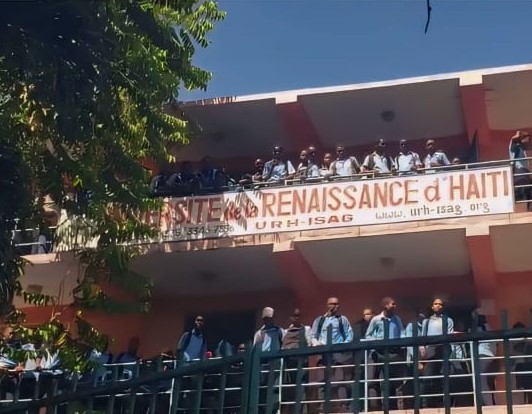Haiti: Youthful mob calls for violence against two gay students
Moïse Manoël-Florisse, is an African-Caribbean online journalist keeping an eye…
Students in Haiti had to be escorted from school by police for their own safety

Students at the all-boys Anténor Firmin public high school in Port-au-Prince, Haiti, called for mob violence targeting after two students who were caught allegedly having sex on school grounds in late June.
The students called for mob justice (“bwa kalé” in Haitian Creole) against the students. Describing the events, some local media claimed the two boys “almost got killed.”
School officials intervened, and attempted to protect the safety of the two young people involved, who had to be escorted out of the school by the police. The school administrators urged the leaders of the rebelling students to return to their classrooms.
Uproar about the incident spread across the nation on social media. Students at Anténor Firmin boycotted classes to protest the sexual orientation of two of their classmates.
Tensions around LGBT issues are high in Haiti, and the government has once again delayed the implementation of a new Penal Code that would ban discrimination against LGBT people and impose stiffer penalties against people who commit violence motivated by anti-LGBT hate.
Erasing 76 Crimes spoke to Merlin Jean, executive director of the human rights group Héritage pour la Protection des Droits Humains (HPDH), about this latest outbreak of homophobia among Haitian society and young people. His analysis of the situation is below:
What do you think of the school’s response to the homophobia at Anténor Firmin Institution?
Merlin Jean: The incident at the Anténor Firmin Institution in Port-au-Prince is a flagrant violation of fundamental human rights, in particular the right to privacy and personal security.
The demand by some students to apply mob justice against homosexual students in the form of “bwa kalé” is deeply worrying. This form of extrajudicial justice is incompatible with the principles of justice, human dignity and the protection of individual rights.
The school administration has taken a courageous stance in refusing this request, stressing that such practices are contrary to an educational environment that respects human rights.
It is essential to continue to promote a culture of respect and protection of the rights of all pupils and learners, regardless of their sexual orientation or gender identity.
How can the school support the two students who have become targeted by homophobia?
Merlin Jean: The students involved in this incident may suffer serious psychological consequences. Public exposure and stigmatisation can lead to anxiety disorders, depression and even post-traumatic stress symptoms. It is crucial that these students receive adequate psychological support to overcome the trauma.
School authorities should therefore set up counselling and support services to help students manage their emotions and reintegrate into a safe and healthy school environment. Raising awareness and training students on issues of diversity and inclusion can also help reduce discriminatory behavior and promote a culture of caring and understanding.
What can the school do to fight homophobia in the student body and community?
Merlin Jean: As a psycho-educator by training, it is imperative to put in place educational programs that promote understanding and acceptance of diversity. The incident highlights the need for proactive education on issues of sexuality, respect for differences and combating stereotypes and prejudice.
Workshops, group discussions and educational interventions can help to raise awareness and promote inclusive behaviour. It is also important to train educational staff on these issues so that they can better support pupils and intervene appropriately in cases of discrimination or harassment.
What can the LGBTI community in Haiti do?
Merlin Jean: As a Haitian LGBTI leader, it is vital to advocate for school policies that protect students from discrimination and violence because of their sexual orientation. This incident underlines the importance of Heritage for the Protection of Human Rights’ (HPDH) ongoing commitment to the inclusion and safety of LGBTI students in educational institutions.
Schools must be safe spaces where every student can learn and develop without fear of discrimination or violence. Working with school authorities to develop and implement inclusive policies, organising training for staff and pupils, and providing educational resources on LGBTI issues is essential to creating a fair and respectful school environment for all.
In conclusion, it is essential to address this incident with a holistic approach that encompasses the protection of human rights, psychological support, diversity education as well as the promotion of inclusive policies. It is only by adopting such an approach that we can hope to create safe, respectful and inclusive educational environments for all pupils, regardless of their sexual orientation or gender identity.




